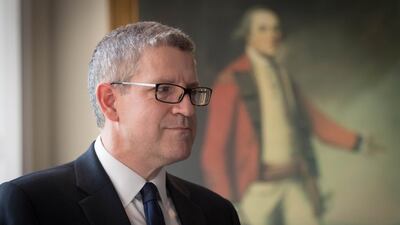The terrorist threat facing Britain is accelerating at a pace and scale never experienced before, the country’s domestic intelligence chief warned in a rare public speech.
Andrew Parker, director-general of MI5, said that terrorist activity is “coming at us more quickly” and “can be harder to detect”.
"In 2017, with all that has happened and much that has not, it is clear that we are contending with an intense UK terrorist threat from Islamist extremists," Mr Parker told journalists in London. "That threat is multi-dimensional, evolving rapidly, and operating at a scale and pace we've not seen before."
The “dramatic upshift” - as Mr Parker called it - in terror attacks has been driven by ISIL’s “murderous strategy and online propaganda”. As it is being driven out Syria and Iraq, the group is directing would-be terrorists to focus elsewhere, he said. That makes the threat "more diverse" than ever.
There have been five terrorist attacks in the UK so far this year, making it one of the bloodiest years in the country’s post-war history.
_______________
Read more:
Europe receives a wake-up call in the battle to counter extremism
'White Widow' British ISIL recruiter ‘killed in air strike’
Tony Blair research institute names six individuals who shaped entire British jihadist movement
_______________
Earlier this year assailants with vans and knives attacked commuters and tourists on Westminster Bridge and London Bridge in two separate strikes, and a van was driven into worshippers outside a mosque in Finsbury Park.
A suicide bomber attacked a concert venue in Manchester in May, killing more than 20 people including young children. In September, an improvised device exploded on London’s underground network, injuring 30 people.
Terror chiefs raised the threat level to critical for a time, meaning attacks were imminent.
Mr Parker said seven other plots by Islamic extremists had been foiled since March, and police have arrested record numbers on terrorist offenses.
“The scale at which we are operating is greater than ever before,” he said. “We are now running well over 500 live operations involving around 3,000 individuals known to be currently involved in extremist activity in some way.”
However, although his agency, also known as the Security Service, is constantly expanding and upgrading its capability, he warned it cannot realistically prevent every single attack.
He added: "Attacks will occur sometimes because this is a free society, a liberal democracy, and we do not monitor everybody all the time," he said. "Nor would we want to live in a country that was like that."
Mr Parker emphasized the importance of working closely with European colleagues and also called on technology companies to not provide a platform for terrorists to plan attacks.
“We have a shared responsibility to do all that we can to prevent terrorist exploitation of internet carried services,” Mr Parker said. “No company wants to provide terrorists with explosive precursors. Social media platforms don’t want to host bomb-making videos. And communications providers don’t want to provide the means of terrorist planning beyond the sight of MI5.”

